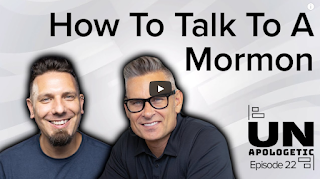The response to my concerns about the "How to talk to a Mormon" video

TL;DR: Synopsis and takeaways from an email conversation with the Christian apologists who created a YouTube video spreading salacious and disturbing misinformation about my religious beliefs. This is my 4th and final post on what I have called "unhinged Category 2 rhetoric" against The Church of Jesus Christ of Latter-day Saints. This rhetoric consists of absurd and salacious false ("unhinged") claims about The Church and its members intended for a mainstream Christian audience (See Part 1 ). The goal seems to be to inculcate in mainstream Christians an instinctual aversion to The Church, in order to counter the missionary efforts of The Church which are seen as a problem for mainstream Christianity. Unfortunately, these attacks lead not only to an instinctual aversion to the The Church, but also to its human members. The result can be (and has been for my family) deeply un-Christian behavior toward us (see Part 3 for the story) from mainstream Christians steeped ...

